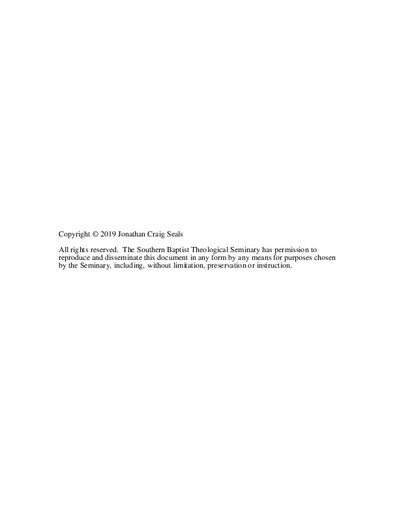| dc.contributor.advisor | York, Hershael W. | |
| dc.contributor.advisor | Pennington, Jonathan T. | |
| dc.contributor.author | Seals, Jonathan Craig | |
| dc.date.accessioned | 2019-08-21T19:37:08Z | |
| dc.date.available | 2019-08-21T19:37:08Z | |
| dc.date.issued | 2019-08-02 | |
| dc.identifier.uri | https://hdl.handle.net/10392/5892 | |
| dc.description.abstract | This dissertation applies the work of Robert C. Roberts in the field of philosophy of emotion to the craft of expository preaching. The purpose of this research is to explore Roberts's definition of emotion and to present a framework of Christian emotional virtues that will aid expositors to preach sermons that better cultivate emotional virtues such as joy and peace.
The first chapter develops the thesis and argues for a biblical warrant for the development of emotional virtues. The second chapter aims at two goals: (1) Present Roberts’ definition of emotion as “concern-based construals.” The paper argues that construals (ways of seeing the world) and concerns (serious desires) are necessary to generate an emotion. As a result, at times, emotions are altered by changing one’s construal of the situation, but at other times, one must address an underlying concern. (2) The second goal is to present Roberts’s concept of Christian emotional virtue. Roberts argues that Christian emotional virtues are made up of biblical construals and a primary Christian concern, namely a desire for God and his kingdom. Chapters three and four offer homiletical applications of Roberts’s work on emotion and Christian emotional virtues. This dissertation concludes that, in order to develop biblical concerns and construals, the expositor must focus on the subjective internalization of both biblical concerns and construals. Chapter three presents several methods of direct communication that establish the Christian construal and also cognitively ground the primary Christian concern. However, in order to transform deeply held concerns and by-pass cognitive defenses, chapter four presents methods of in-direct communication that address the inner world of the hearer. This work argues that both direct and indirect forms of communication should be utilized together in order to provide a holistic approach to the subjective internalization of biblical concerns and construals; with the result of subjective internalization being the cultivation of Christian emotional virtues. | en_US |
| dc.subject.lcsh | Roberts, Robert Campbell, 1942- | en_US |
| dc.subject.lcsh | Expository preaching | en_US |
| dc.subject.lcsh | Emotions--Religious aspects--Christianity | en_US |
| dc.subject.lcsh | Christian philosophy | en_US |
| dc.subject.lcsh | Virtues | en_US |
| dc.subject.lcsh | Emotions (Philosophy) | en_US |
| dc.title | Emotional Virtues in a Faithful Expository Ministry: Utilizing Robert C. Roberts to Argue for a Model of Expository Preaching That Fosters the Maturation of Emotional Virtues Within a Congregation | en_US |
| dc.type | Electronic dissertation | en_US |
| dc.type | Text | |
| dc.contributor.committee | Johnson, Eric L. | |
| dc.type.qualificationname | Ph.D. | en_US |
| dc.publisher.institution | Southern Baptist Theological Seminary | en_US |
| dc.publisher.department | School of Theology | |

